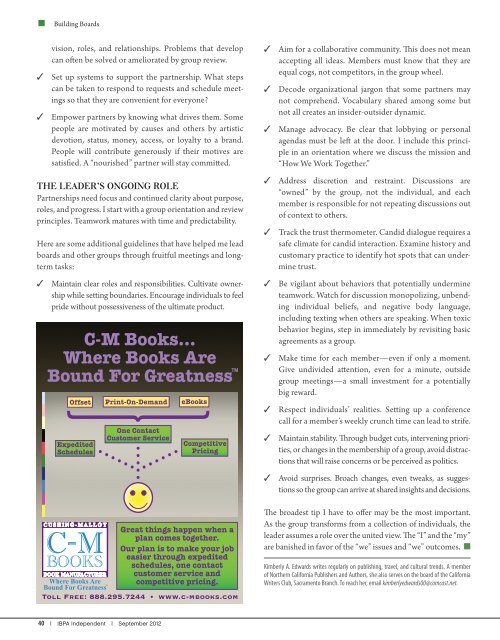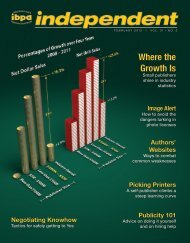Book- Business Lingo
Book- Business Lingo - Van-garde
Book- Business Lingo - Van-garde
Create successful ePaper yourself
Turn your PDF publications into a flip-book with our unique Google optimized e-Paper software.
■Building Boards✓✓vision, roles, and relationships. Problems that developcan often be solved or ameliorated by group review.Set up systems to support the partnership. What stepscan be taken to respond to requests and schedule meetingsso that they are convenient for everyone?Empower partners by knowing what drives them. Somepeople are motivated by causes and others by artisticdevotion, status, money, access, or loyalty to a brand.People will contribute generously if their motives aresatisfied. A “nourished” partner will stay committed.The Leader’s Ongoing RolePartnerships need focus and continued clarity about purpose,roles, and progress. I start with a group orientation and reviewprinciples. Teamwork matures with time and predictability.Here are some additional guidelines that have helped me leadboards and other groups through fruitful meetings and longtermtasks:✓Maintain clear roles and responsibilities. Cultivate ownershipwhile setting boundaries. Encourage individuals to feelpride without possessiveness of the ultimate product.✓Aim for a collaborative community. This does not meanaccepting all ideas. Members must know that they areequal cogs, not competitors, in the group wheel.✓ Decode organizational jargon that some partners maynot comprehend. Vocabulary shared among some butnot all creates an insider-outsider dynamic.✓ Manage advocacy. Be clear that lobbying or personalagendas must be left at the door. I include this principlein an orientation where we discuss the mission and“How We Work Together.”✓ Address discretion and restraint. Discussions are“owned” by the group, not the individual, and eachmember is responsible for not repeating discussions outof context to others.✓✓Track the trust thermometer. Candid dialogue requires asafe climate for candid interaction. Examine history andcustomary practice to identify hot spots that can underminetrust.Be vigilant about behaviors that potentially undermineteamwork. Watch for discussion monopolizing, unbendingindividual beliefs, and negative body language,including texting when others are speaking. When toxicbehavior begins, step in immediately by revisiting basicagreements as a group.✓ Make time for each member—even if only a moment.Give undivided attention, even for a minute, outsidegroup meetings—a small investment for a potentiallybig reward.✓✓✓Respect individuals’ realities. Setting up a conferencecall for a member’s weekly crunch time can lead to strife.Maintain stability. Through budget cuts, intervening priorities,or changes in the membership of a group, avoid distractionsthat will raise concerns or be perceived as politics.Avoid surprises. Broach changes, even tweaks, as suggestionsso the group can arrive at shared insights and decisions.The broadest tip I have to offer may be the most important.As the group transforms from a collection of individuals, theleader assumes a role over the united view. The “I” and the “my”are banished in favor of the “we” issues and “we” outcomes. ■Where <strong>Book</strong>s AreBound For GreatnessKimberly A. Edwards writes regularly on publishing, travel, and cultural trends. A memberof Northern California Publishers and Authors, she also serves on the board of the CaliforniaWriters Club, Sacramento Branch. To reach her, email kimberlyedwards00@comcast.net.40 | IBPA Independent | September 2012








